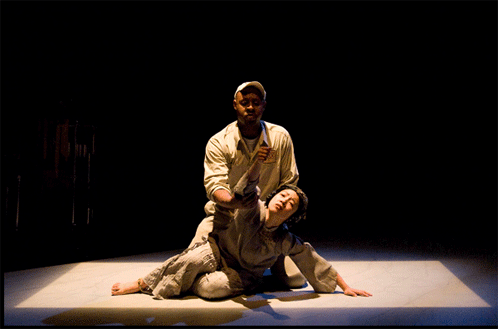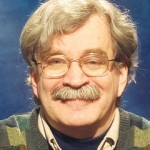
- Knussen conducts Maderna. Photo credit: Hilary Scott
The 2010 Festival of Contemporary Music at Tanglewood has moved away from its recent model of having a solo curator conceive the festival. Instead, the curatorial duties are shared by three of its longtime faculty members: Gunther Schuller, Oliver Knussen, and John Harbison. The focus this year is on Tanglewood’s past and present faculty composers. Far from feeling like ‘old home week,’ the programming has demonstrated a wide range of stylistic diversity among those who’ve taught at Tanglewood. In addition, one can observe how each successive generation of Tanglewood students has benefited from their instruction here and, in several cases, returned to mentor the Festival’s next generation of up and coming composition fellows.
Thursday August 12’s concert felt the curatorial presence of Gunther Schuller looming large, although the composer himself wasn’t present (apparently, he has a conflicting commitment at the Edinburgh Festival). One could hear why he might be attracted to George Perle’s Concertino for piano, winds, and timpani (1979). Though Perle isn’t generally known for jazziness in his music, the Concertino mixes some lushly voiced verticals – recalling Gershwin or, indeed Schuller in Third Stream mode – amidst the otherwise prevailingly neoclassical ambience. William McNally played the solo piano part with dextrous execution. Both he and the ensemble, led by Cristian Macelaru, provided a well prepared account of the Concertino, sensitively shading its complex harmonic palette.
Theodore Antoniou’s Concertino for Contrabass and Orchestra (2000) was a virtuoso showcase for soloist Edwin Barker. Rhythmically propulsive and harmonically eclectic, it demonstrated a host of playing techniques for the instrument. Barker rose to every challenge, suggesting that the bass fiddle is not just some lumbering beast to be kept confined to anchoring the orchestra’s low end. Rather, in Barker’s hands, it proved nimble, wide-ranging, and capable of thrilling effects: one especially noticed the brilliant glissandi harmonics.
Schuller’s Tre Invenzioni (1972) an angular piece for five spatially dispersed chamber groups, was conducted by Oliver Knussen, who artfully shaped its often punctilious, angular surface. One didn’t envy the students for having to tackle some of the exposed and punishing altissimo lines Schuller put in their paths. But it was an impressive rendering of this unforgiving and formidable piece.
Written in 1922, it’s somewhat curious to find Paul Hindemith’s Kammermusik No. 2, an incisive but conservatively neoclassical work, on a festival devoted to contemporary music. But Hindemith did indeed serve on Tanglewood’s compositional faculty back in 1940-41. That connection alone might not suffice for some, who might wonder why they couldn’t program one of his more daring works. But the piece was well worth hearing if only to enjoy pianist Nolan Pearson, who played with dazzling virtuosity and impressive, almost Mozartean, elegance, as well as the fine support he received from an ensemble conducted by the youthful up and comer Alexander Prior.
The highlight of the evening was a thrilling performance of Bruno Maderna’s Il Giardino religioso (1972), led by Oliver Knussen. Dedicated to longtime Tanglewood patron Paul Fromm (the title’s religioso is a pun on the meaning of Fromm: “devout”), this chamber orchestra piece contains quasi-aleatoric complexity and bold theatricality.
Things began with a bit of a snag. In the midst of the work’s hushed introduction for antiphonally seated solo strings, an audience member took a cell phone call, interrupting the proceedings. Sans histrionics, Knussen stopped the performance, tramped offstage, and returned after a moment. “Let’s try again,” he said.
One was certainly glad that he did, as the delicate balance of the resumed opening brought the now raptly attentive audience into a fascinating labyrinth of sounds. Knussen got to do double duty as a performer, first playing chimes, then drums, and finally celesta. The piece builds to a ferocious climax which is punctuated by two large cymbals being flung to the ground. In a gradual denouement, it returns to gently haunting antiphony. Incantatory music, magically rendered. Makes me want to hear much more Maderna!
The festival continues through Monday, August 16th. Stay tuned for more dispaches from Lenox.




 An overly self-conscious trip to a store with a flyswatter in hand inspires Christopher Penrose to create
An overly self-conscious trip to a store with a flyswatter in hand inspires Christopher Penrose to create 
